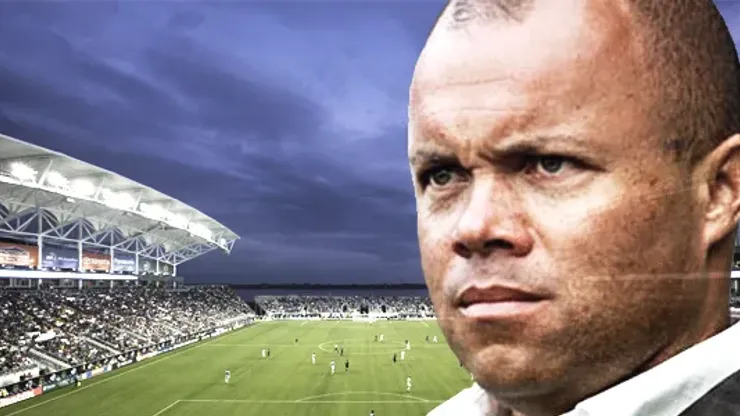Some figures are obvious big influencers in American soccer. Men like Bruce Arena, Landon Donovan or Alexi Lalas (and, yes, even Jurgen Klinsmann), or women like Mia Hamm or Brandi Chastain, albeit perhaps for different reasons. But we’re going to have to add a name soon who isn’t quite so obvious.
It’s Earnie Stewart, who was just named Philadelphia Union’s sporting director, a fancy way of saying he’ll be the man with the plan around PPL Park. And few MLS franchises have been in so desperate need of a larger, over reaching plan.
Before we talk about what this means for Philadelphia – and there is a lot to unpack in that one – consider what the man has already meant to the American game:
The Dutch-born Stewart topped 100 caps over 15 years for the United States. (He got to 101.) As a refresher, he didn’t just participate in three World Cups, although that would have been a sizable accomplishment on its own. Stewart was influential in three World Cups, scoring against Colombia in the upset of the 1994 World Cup. Eight years later, the versatile winger/forward played in the two signature wins at World Cup 2002: the shocker over Portugal that set it all in motion and, later, the most important “Dos a Cero” to date, the Round-of-16 win over Mexico.
SEE MORE: MLS average attendance increased 13% in 2015.
(Quick aside: I did a radio interview with Stewart about two years ago. He was not interested in reminiscing about good old days. He was interested in politely, professionally conducting the interview and then getting the heck back to work.)
A long-serving member of the US Soccer staff tweeted Monday that nobody was more proud to put on the U.S. jersey than Stewart. If you’re overly cynical, that might not mean anything to you, but it does to a lot of us.
His pride in playing for the United States national team matters because, in the bigger picture, Stewart now sits in a position to influence how we develop talent in this country. (Because he’ll be influential in running the Union’s academy program.)
A few might remember Stewart’s short run in MLS, with D.C. United, 2003 and 2004. But only the Black and Red supporters in our nation’s capital are likely to remember that Stewart won an MLS cup with United during his time at RFK (in 2004).
So the man had checked a lot of boxes in U.S. soccer before returning to his native Netherlands, where his shrewd planning in development and personnel made him such a front office sensation. Leander Schaerlaeckens wrote a great piece on Stewart’s innovative methodologies three years ago.
Now, Stewart has a chance to remake a club that can thank its lucky stars Chivas USA was around for a bunch of years to set the bar so low in franchise bungling. Otherwise, fingers may have been pointing toward the City of Brotherly Love. (Well, Toronto FC for most of those years, too.)
The Union isn’t Chivas USA in its level of odd instances and absurd choices, but at times it brushed uncomfortably close. The recent, overdue choice to jettison Nick Sakiewicz got things going in the right direction. Now, hiring Stewart becomes the real, potential game-changer. Stewart may not get it right, but his measured ways, proven track record and highest levels of respect give the Union the best shot, at least, in moving things into a better place.
At the very least, they definitely won’t try to corner the market on goalkeepers again.
SEE MORE: If Jason Kreis is in trouble, so is NYCFC.
To be sure, this is one of the few moves that makes everyone else around MLS stop, take notice and think: “Hmmm. We’re all gonna need to up our own game a little bit now.”
I honestly don’t know about comparisons to “Moneyball” and all that; we’ve all thrown that term around so much it has lost some definition. I just know that what Stewart has accomplished at AZ, a Dutch club with little money but a pretty remarkable rate of recent success, isn’t an accident.
Yes, he comes into a remarkably different MLS than he left in 2004; but does anyone have serious doubts about Stewart’s ability to dig in and figure it out? It’s not nuclear science, after all; it’s just taking what he already knows about identifying talent on the international and domestic markets and then fitting it all within Major League Soccer’s quirky acquisition mechanics.
“I look forward to working with everyone at the Union to establish a clear playing philosophy and use my experience to create a competitive edge in our methods of recruiting and developing players at all levels of the club,” Stewart said in a release from the club, “from the academy up through the first team.”
200+ Channels With Sports & News
- Starting price: $33/mo. for fubo Latino Package
- Watch Premier League, Women’s World Cup, Euro 2024 & Gold Cup
The New Home of MLS
- Price: $14.99/mo. for MLS Season Pass
- Watch every MLS game including playoffs & Leagues Cup
Many Sports & ESPN Originals
- Price: $10.99/mo. (or get ESPN+, Hulu & Disney+ for $14.99/mo.)
- Features Bundesliga, LaLiga, Championship, & FA Cup
2,000+ soccer games per year
- Price: $5.99/mo
- Features Champions League, Serie A, Europa League & Brasileirāo
175 Premier League Games & PL TV
- Starting price: $5.99/mo. for Peacock Premium
- Watch 175 exclusive EPL games per season






